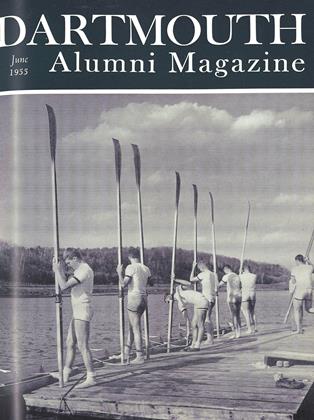The "Phoodnik"
To THE EDITOR:
Dr. George E. Gardner's article on Man'sAggressive Nature (which recently appeared in the MAGAZINE) can stand by itself and needs no defense. However, since there was one reader who felt strongly enough to register dissent, may I rebut. The objection that Dr. Gardner threw words around with arbitrariness seems unjustified to me as I understood what he was saying very well. However, for those who felt that he was abitrary and too general, may I point out that he was trying to give his views on a topic of tremendous breadth condensed so as to be suitable for publication in our magazine. I assure Ph.D. Basecu that Dr. Gardner knows well the meaning of these words and equally well knows how to apply the concepts to clinical material. Readers who would like to find a more complete discussion of these concepts are referred to the Psycho-Analytic Studies ofthe Child, Volumes 1 to 10, as a starter. Mr. Basecu's association to Dr. Gardner's article is an interesting bit of humor, but hardly strikes me as science or hardly applying to the article.
All of this reminds me of the newest addition to American slang: the "phoodnik." This word is in the family of "the shmoo," "the dullnik," and the "no-goodnik." It is precisely defined as "the no-goodnik with a Ph.D.," and I assure you that this association has no scientific connection with any evaluation of Ph.D. Basecu but is completely a part of my own prejudice against Ph.D.'s.
New Britain, Conn.
A Dr. Seuss Fan
To THE EDITOR:
As one who aims to keep abreast of things Dartmouth, my ignorance continues to amaze and mortify me. Only in my last night's reading of the December "Magazine" did I learn that Dr. Seuss is Theodor S. Geisel of the Class of 1925.
The College displays murals by Orozco, which I do not fancy, and by my classmate Walter Beach Humphrey, which I do fancy.
Is there not a suitable wall space in Hanover where the droll humor of Dr. Seuss could be perpetuated? Surely a Dartmouth artist whose work has brought lightness to a generation of work-a-day advertisements is worthy of Dartmouth recognition.
Toward such a project I would gladly contribute a modest sum.
Staten Island, N. Y.
What More Do You Want?
To THE EDITOR:
While the fortunes or misfortunes of a college hockey team are not of any great consequence at this particular point in history, yet it is always true that little things make up the large things which are important. Doubtless from the viewpoint of the members of the organization, the Dartmouth College Hockey Team of 1954-55 enjoyed an interesting season. Reportedly outclassed by teams stronger position by position, and competing during a postwar period when collegiate hockey is both better and more highly competitive than it ever has been, Captain Hennigar and his mates made a most creditable showing. At one point they ran up a fair winning streak over redoubtable opposition and ended the season with very nearly a .500 average. Considering the fact that against normal opposition, a team of legitimate college students stands by law of averages to do little better than break even over the years, one might even say that the current edition of Dartmouth hockey teams had done well. Considering further that even though a team is a representative of the College, it is also an opportunity for individuals to participate in athletics and to achieve thereby personal development of various sorts, one might reasonably infer that the members of this year's team had gained a good deal for themselves. And while they may have "run out of gas" toward the end of a long and wearing season, we can be sure that they never stopped trying.
Thus when the ALUMNI MAGAZINE'S sports "publicist" (is that the word?) chooses to announce that "One of the most dismal hockey seasons in Dartmouth history drew to a close etc., etc.," one wonders exactly what the basis for his judgment is. No doubt there have been better seasons from a won-lost standpoint, but on the same basis there have been worse seasons. What does the "publicist" mean? Is he inferring that the players gave up and let the coach down, let the College down, let him down? For whom was the season dismal? The student body, who must have seen some good games during that winning streak? The coach, who inconceivably wants to beat everybody all the time?
Of course this all adds up to the fact that, intentionally or not, the "publicist" is panning the team and saying in effect that the team was lousy and the players inferior. A team composed of players not as highly skilled, perhaps, as those of the opposition gives its best for itself and the College and comes out with practically a .goo average. To use an expression employed by the publicist, what the H--- more do you want?
Northfield, Mass.
 View Full Issue
View Full Issue
More From This Issue
-
 Feature
Feature"The Real Business"
June 1955 -
 Feature
FeatureTIMOTHY WAS BEFORE YOU
June 1955 By DANIEL CHASE '14 -
 Feature
FeatureOPERATION BOOTSTRAP
June 1955 By FRANK PEMBERTON -
 Article
ArticleStudent Report
June 1955 -
 Class Notes
Class Notes1918
June 1955 By ERNEST H. EARLEY, RICHARD A. HOLTON -
 Class Notes
Class Notes1923
June 1955 By CHESLEY T. BIXBY, THEODORE D. SHAPLEIGH







